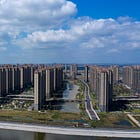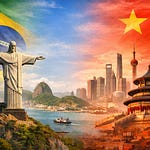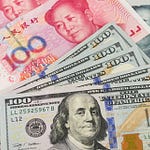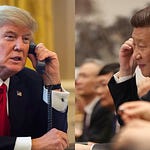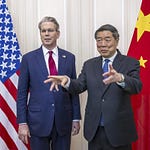Welcome to debut episode of Baiguan Radio. In today's rapidly changing global landscape, questions abound. How is the business environment in China adapting amidst geopolitical tensions such as evolving China-US dynamic? As Hong Kong undergoes significant shifts, what is its impact on the broader investment and business sectors? And, beyond the conventional narratives, what is the real experience within China's state-owned enterprises? Are they as bureaucratically entrenched as perceived, or is there a more complex reality?
Today, we're joined by Jay, a seasoned investment banker and native Hong Konger with 15 years of firsthand experience. He offers a rare perspective that blends deep professional insight with on-the-ground experience. We'll explore the intricacies of doing business in China, demystify the operations of state enterprises, and gain an understanding of the aspirations and challenges faced by today's entrepreneurs, especially those in the private sector.
For those who prefer reading along, here's the transcript of today's episode for your convenience.
Robert: [00:00:02] Hello everyone. Welcome to the first episode of Baiguan Radio, the podcast series affiliated with the Baiguan Newsletter. My name is Robert Wu, a co-editor of Baiguan. At Baiguan, our mission is always to provide you with the most relevant and the most unbiased data points, as well as viewpoints about China. Through Baiguan radio. We will invite people from all walks of life to give you a fresh idea of what real people on the ground are thinking about in China. Today, for our first episode of Baiguan radio, we are inviting my dear friend Jay. Jay is an US educated Hong Kong native. He's a veteran investment banker based in Hong Kong and started his career 15 years ago during the height of the global financial crisis. In this episode, we will talk about his memories about what he considered to be a golden era of Hong Kong banking, his takeaways from working with both officials of China's state owned sector, as well as grass roots private entrepreneurs. He will also touch on the topic of what Hong Kong's future holds from the perspective of an actual Hong Konger after the 2019 crisis and three years of Covid. Jay is not his real name. He requests for anonymity, both because of the sensitive nature of his profession and because he wants to be as candid as he can. So let's welcome Jay. Hi, Jay. How are you?
Jay: [00:01:51] Hi, Robert. Good, good. Thank you for having me.
Robert: [00:01:56] Thank you for joining our very first podcast at Baiguan. Um, yeah, let me introduce you a little bit to our audience. So Jay is a long-term friend of mine. We also used to work together a few years back. Jay was an investment banker at a big bulge bracket Global Investment bank based in Hong Kong, helping companies do IPOs, do M&A. And for the last couple of years, Jay was an independent banker and investor, also based in Hong Kong but did a lot of deals both in China as well as in Southeast Asia. So I would always, count Jay as one of the most knowledgeable friends when it comes to doing businesses and investment in Greater China region. So I'm very excited to welcome Jay here. Um, yeah, so, so, so, Jay, how about how about you introduce a little bit about, you know, what's your background especially in terms of your career, what kind of, what type of businesses you've been dealing with. What are some of the ups and downs.
Jay: [00:03:27] Yeah. Thank you, Robert, for the introduction. Well, I guess that was an overstatement to say I'm one of the most knowledgeable among your friends. It's a pleasure and an honor to be on your podcast. So, what you asked before, maybe just to talk a little bit about my background. I was in investment banking for one of the bulge bracket banks based in Hong Kong, mostly covering the Chinese market. I've been doing that for nearly ten years before I quit to do my own stuff. And in terms of ups and downs of my career, I probably wanted to point out the fact that I joined banking in a very interesting time right in the middle of the 2008 financial crisis. So that was an interesting period where when I first started, there was. No deals whatsoever in 2008 until probably the second half of 09. So that was around 12 to 18 months where everybody was just you know, I was a rookie. I didn't have an idea what was going on. And everybody was, you know, just trying to keep our job secure so our class, our friends. Disappearing, rounds and rounds of layoffs. Well, luckily, I stayed on so so that that that was a very memorable experience to begin my my banking career. I guess, the common theme would be, the cycles are getting shorter and shorter in capital markets. You can see the ups and downs and you can see the stock market, you can see the capital market. The cycle was getting shorter. So when you go back in time or when you look at the US market, it's very different. So before the 07/08 property crisis in the US, you probably saw a ten year sort of up cycle, right? Yeah. And that was a good time even for Chinese investment banking. I think at the beginning of the century, it was great for 5 to 7 years until 08 and Chinese companies were starting this, you know, capital market or or IPO spree just right probably after 2005. And that's really when Chinese companies started to hit the capital market internationally. Since then. Uh, and and then we have this, you know, 08 financial crisis brought on from the US side. But China probably turned around very, very quickly after 12 to 18 months. But ever since the 08 crisis. I think cycles are just getting shorter and shorter. So you see the investment banks, you know, having a hiring spree at a good time. And then by the time the new hires join, a down cycle would already hit you and then you start a layoff. So that keeps on repeating and repeating. So I guess that those cycles get shorter and shorter until very recently, in the last few years in the pandemic where we had a short period of good time in 20. And then since then everything has been quiet. We were hoping for a better time after the opening up at the end of last year, but looks like the market hasn't really come back. Some small recoveries in terms of the indexes, but you don't really see any deals going on. In terms of investment banking. So that's probably my impression of the common theme in sort of capital markets on the China side or, you know, in the investment banking side.
Robert: [00:08:29] Right, Right. Just maybe let me dial back a little bit. So when you started out your career and you had like, say, one year of almost no deal, but once the deals are coming back, what kind of deals are they? What kind of clients you're working with? Are they mostly just state-owned enterprises or are you mostly working with, or private entrepreneurs? Maybe just give us a little bit more color on the type of people, the type of companies that you're working with.
Jay: [00:09:03] Yeah. I mean, it's both, right? So I think it's safe to say that after the financial crisis in 08, in the following probably 5 to 8 years, there was this rush of Chinese companies going public, right? Well, probably since 05. For that ten years, you see a rush of spree of Chinese companies going public. So it's mainly IPO deals at the time. It's I would even say it was sort of like a commodity. It's an IPO factory. Okay? So you're just doing deals after deals. Deals after deals. And, at the time it was really welcomed by the market. So, yeah, you know, I was a rookie. I didn't know anything about it. I thought IPO was just really, you know, mechanical. It's just easy to sell stocks. I remember when I was a junior, I never worried. I never really thought about that would be challenged to sell stocks. You know, fundraising was easy. All the deal sizes were billions and billions of US dollars. And you never think about, you know, under subscribing, a shortfall in the order book in book building process. Nothing, nothing like that.
Robert: [00:10:34] When did it hit you that there's actually the problem of not being able to sell?
Jay: [00:10:40] I think it was approaching 13 or 15. Yeah. 2013 or 2015. In my first few years after the financial crisis, never ran into problems like, you know. This is not happening. Never. So that was then that was really like an IPO factory. You never worry about demand of stocks. Right?
Robert: [00:11:10] So it seems like your generation of kind of bankers in Hong Kong really, really have this kind of golden era, right. When you think back?
Jay: [00:11:20] Well, I would hope so. Maybe it would be even better to start a little a few years earlier, maybe from 05, that would from 05 to 07 to 08, I think I would I would say that was the golden era, you know, in terms of in terms of a remuneration. Right. Yeah.
Robert: [00:11:43] Great. Thinking back, what's the most memorable part, You know, or just give us one of the most memorable chapters for you.
Jay: [00:11:55] Well, I guess. Personally, it was the, the all nighters that you have to go through, as a junior. But I think, as a banker or as a, as a banker right after or right a fresh out of college. It's a very, very steep learning curve. And it is a great opportunity for, you know, for a young man or young woman like myself back then to have the opportunity to meet with, you know, the most successful entrepreneurs or the highest ranking officials of the state owned enterprises face to face. And and I think that's not something you come across that easily at a young age like that to, you know, sort of understand what they are thinking, what they are, what they have experienced to get to where they were, at such a young age. So I think that's the most memorable aspect of the banking career, especially at a younger age.
Robert: [00:13:17] Right, Right. I can see that you talk about two types of clients, so at least two types, right? You have the state-owned sector and you talk to the basically officials or quasi officials from the state sector and you talk about private entrepreneurs. Two types of businesses. So let's talk about them one by one. What about the state sector? It's obviously right now playing a bigger and bigger role in Chinese economy. And I know that a lot of our audience are also having problems understanding how to deal with the Chinese government, the state sector, the state economy. Coming from your background, when you were like, as you say, a rookie, a young banker, and you got to know these people, really high-ranking officials, what's your experience, what's your learning curve about that? What did you learn from it? What's something that you didn't realize before? But after this many years you have grown to be more knowledgeable about and what kind of, things that you think probably other investors or other bankers, foreign investors, they get wrong about often. So is there anything that you want to share here?
Jay: [00:14:48] I have never really directly dealt with the government agencies in China, but apparently many of my colleagues and friends did. But I did have a lot of direct dealings with some of the biggest SOEs in China. I think it's very easy for outsiders to have this typical stereotype of the state owned guys or the government guys being very bureaucratic and inefficient. But truth is, within the government and within some of the top state owned companies, they have some of the smartest people in their team, but of course they are bound by so many restrictions and they got different sort of agenda and a different sort of target or KPI that they are given, versus [what] some normal private businesses would consider. So things that they do sometimes you might not understand and it's very easy for you to get the impression of inefficiency and doing work, that is probably, you would say useless. But, but but, you know,
Robert: [00:16:19] Is there any example you can think of, I mean, just anonymously?
Jay: [00:16:24] But. Well, I guess, within an SOE or within the government there are layers and layers and of different departments and the teams are huge. So for us, if you are trying to just get this task done. It's very easy, right? Within investment banking, there is just 1 to 2 guys really just working on a live deal. You just want to get things done. But when that problem gets reported to your client, well, they would think very, very differently. Most of what they think is how do they answer to their boss and how do they actually, cover sort of their responsibility. So, so that would make things very challenging and difficult. But that said, sometimes, when the top guy wants to make things happen. Things can move very, very quickly. So it really depends on the will of the decision making guy. So that's very important. I think that would reflect sort of similar system of our country. We are running a large government, right? This [SOE] is a small government system. And it's not easy to sort of run this administration. So I think what I want to point out is that when our country chooses the right direction, this top down administration system can actually drive things very, very quickly and efficiently. But the billion dollar question is what is the right direction? That is not easy. And given the current complex geopolitical environment, it's an even tougher question to answer. And for leaders to, you know, sort of tackle and consider everything, all the factors, all the conflicting factors together and to steer the country into the right direction. Same for an SOE, so that's really what I want to point out. It's a tough situation right.
Robert: [00:19:15] Basically the SOEs you are working with are, you saw that as a small version of the bigger country that we we operate in, correct?
Jay: [00:19:29] Correct.
Robert: [00:19:30] Interesting. Yeah. So so what about the.
Jay: [00:19:33] It's a reflection of how this country is run, right?
Robert: [00:19:38] Right, right, right. Wow. So so so if you really know about how China is run, better start your career as an investment banker help SOEs raise capital!
Jay: [00:19:51] Yeah. You know, back then, even for SOEs, it's easy to raise capital. I remember doing, you know, sort of bond deals, one of the top rated SOEs, you know, three, 3 billion, 5 billion debut. Closed within a matter of days or actually hours, maybe.
Robert: [00:20:16] Wow. Wow. Yeah. So what about the the private, the entrepreneurs? Because when we were working together, I actually witnessed you, basically working side by side with, owners, entrepreneurs of businesses worth hundreds of millions or even billions of dollars. And you seem to be like really at ease. I said you were one of the most knowledgeable friends because of the fact that when you were dealing with a lot of these entrepreneurs, you seem to really know your way around. That's something that always amazed me. So so what do you think about them? What type of entrepreneurs that you've been working with and is there any people that specifically amaze you, what you learn from them? I'm really curious to know about that.
Jay: [00:21:19] Yeah, that's a great question. So, you know, well, just just like yourself, I'm always amazed by all these Chinese businessmen and entrepreneurs. There are, you know, there are the good sides and the sort of not so ideal side of Chinese businesses, right? Uh, uh, Chinese businessmen, they are also, very, very diligent and hard working. They work days and nights. They have this strong desire to accomplish. To succeed. I think that's one of the most important driving forces for the Chinese economy to have this desire and, you know, to succeed. So I think that's what amazes me the most to witness some of those, you know, strong wills of the entrepreneurs. And that aside, I think the Chinese business environment are more difficult than some of the other developed markets. Super, super competitive. That's also why you always see, you know, price wars, cutthroat prices in all aspects in doing business in China. That's tough. So. this will to make money, to survive. Is particularly crucial in the Chinese business environment. Well but it is what it is, right? This country came from nowhere to where it is today in a matter of a few decades, and that's a super competitive process with such a big population.
Jay: [00:23:32] And and I think many of the businessmen or entrepreneurs to begin with. Uh, it's really, this guts or, let's say, risk appetite, rather than professional knowledge in the refers to 20 years. Right? So if you're willing to take the risk and of course, you need to be you need to be smart, you need to be diligent, you need to be able to deal with people. And those are the basic qualities. Doesn't guarantee you, but those are what you definitely have to have. Before anything else. And then you just need to be risk-loving. You just need to, take the risk and do what you do and you might be able to survive. You might be able to stand out, in the crowd. So but then, you know, we can see this transition in the last, I don't know, last 10 to 15 years. It's no longer that kind of story where you are bold enough, you're willing to take risk. Many people probably took risk in the last 3 to 5 years, and they probably regretted it today, including the historically very, very successful businessman. It's a it's a very different place today.
Robert: [00:25:07] Let me let me ask you this. Like on the percentage wise, I mean, you've been working with so many entrepreneurs now, like, say, over the last decade or so. How many of them are doing better today than you first met them? How many of them are percentage level are doing worse. Where are they now? Are they just still running their business as well, or are they just quitting? I mean, can you give us a kind of a feeling of that?
Jay: [00:25:43] Well, unfortunately, I have to say, I couldn't pinpoint an exact figure, but I think it's safe to say that most of them are not doing really, really well.
Robert: [00:25:58] Wow. Wow. Right.
Jay: [00:26:01] Well, you see many who have been in default and you have seen many who are not as aggressive, then you see their wealth shrink, but maybe, well, relatively speaking, they are doing better than some others. So most of the people are not doing so well today. Well, I guess that's predictable, right? Because it's a really, really different trajectory. Five years ago, if you look back in 40 years, everything is going up. In the investment banking industry, you only see the most successful guys. So when the country or the macro environment is all going up. And you see those who survive and succeed in that kind of environment. Everybody was doing so well. But then when you are in the middle of this kind of trajectory, it's very easy for you to think that if you work hard, you invest, you will get results and rewards. But then when the direction change. It's very easy to make mistakes or not mistakes, it's very easy to get a very, very different result than before. You're just doing the same thing. Right? So, I think that's the only comment that I can make. But well, of course there are some other entrepreneurs who are still doing well today, given some sort of favorable policies. For example, the renewable energy guys, the EV guys, the semiconductor guys. But well, I think, it is very, very rare even in these hot industries, you probably only see a handful of guys who are actually really doing well right now.
Robert: [00:28:19] Right. It's fascinating to hear that this rough statistics from you. I've actually never thought about that in this kind of regard. So this seems like really tough. It seems like really tough the last couple of years.
Jay: [00:28:36] Yeah, it is tough. And and I think after 40 years of only uptrend, if you take a step back, it's it's probably not so surprising to see things turn out, to hit a plateau. So the more important question is how do you sort of maintain that kind of status for a while and and steer things up again rather than going down. So, I think people need to get used to that.
Robert: [00:29:20] Right. Do you think you will ever comes up again?
Jay: [00:29:26] Well, I hope so. Right.
Robert: [00:29:31] What do you think it will take?
Jay: [00:29:33] Now, you know, honestly, if you ask me, I don't know. I just hope things will turn for the better. But but let me say this. I think Chinese people are one of the most hardworking people in the world. And they and we always have the desire to make our lives better, to create, to work for our better being. I think I would always believe that kind of nature or characteristics in Chinese people. So given the right environment, given the right context, well I believe we will thrive again. So but it really depends on the kind of macro environment we are given.
Robert: [00:30:29] What do you want to see more of?
Jay: [00:30:33] Well, I think confidence matters the most, right? I always believe that economic or social development is often led by very few people who are willing to take the risk to invest. You know, GDP, employment, household disposable income. They are created only because those very few people who are willing to, put everything they have to invest and to create and to build a business. So I think confidence of businessmen and entrepreneurs to invest needs to be restored. And in order to restore, I think it is also important to recognize that the desire to make profit is not shameful. We need to set aside all these kind of ideology of, well, you need to just, you know, contribute and not ask for rewards. That's just not human nature. We need to recognize the human nature to work hard, to take risk and to be rewarded. And and and humans are just, you know, I hate to say that, but we are greedy. We want something, right? We contribute. We want something in return. We got to recognize that human nature so that we will be able to make policies based on human nature so that people's confidence can be restored and continue to contribute rather than, people have been saying, I'd rather not invest and just keep what I have. And some people might think I might just, run, so that that's what you don't want to see.
Robert: [00:32:32] Right. Right. It's great that you articulate it so well. Yeah, I hope more people hear about this. Great. So let's switch gears a little bit. So we talk a lot about the economy, your business career. How about another thing? You also are one of the very few friends of mine who works on a lot of the China business side, but also, you are almost a Hong Kong native. I know that you were not born in Hong Kong, but you moved to Hong Kong from mainland China at a very early age. To me, you are like just at the same time a Hong Kong local resident, but at the same time, you are also, you know, you speak perfect Mandarin, you speak one of the best Mandarin that I know of for a HongKonger, Right? So so is that common thing? I mean, from where you where you raised up, where you were growing, is that a common thing? Can you share a little bit about your background going way back?
Jay: [00:33:46] I think, that there's two aspects, right? I would probably say that it is not very common, especially in the financial markets. So but you see, many of my earlier peers, my childhood friends, actually, it was quite common because, you know, Hong Kong and Guangdong have very, very strong ties. You have you have families broken up in two places. So you always have this movement from, uh, Guangdong or other parts of China to Hong Kong at younger age. That was common. But within the financial market, it's really not common. So I bet it is safe to say that I can understand both sides a little more than other people. So, uh, you know...
Robert: [00:34:42] What's what's about the financial market?
Jay: [00:34:44] Yeah, I think for the financial market, most most people probably come to Hong Kong, for college, but many more after college to join the professional industry. So identity wise, it feels very, very differently. I identified myself as both a Hong Kong native as well as a Chinese. I strongly recognize my Chinese identity, if that's one of the questions that you're referring to. And but I also deeply understand what Hong Kong people think. So, you know, I went to a local school. I went to an international school afterwards, and then I went to the US for college. So I bet it is safe for me to say that I can probably understand very deeply how both sides think. And I had always made it a mission to sort of bridge the gap. You know, I always want to resolve this misunderstanding of one side to the other. So whenever we discuss this issue, it always intrigues me to sort of trying to explain where people are coming from from the other side. So yeah, that's my background, right?
Robert: [00:36:18] For those who don't know, I learned quite a bit of Cantonese slang from Jay as well. You're right, you're always the bridge builder. So the last couple of years, we all know that it's been quite difficult for Hong Kong, right? You have both social unrest, historic social unrest in 2019. You and you have three years of Covid following that as well. A lot of social tension, a lot of turmoil, a lot of anxieties. And I know many Hong Kongers were upset and some of them were leaving Hong Kong. So for the people, you know, I'm really curious for the people, you know, that have left, who are they mostly? And for those who chose to stay, what type of people are they? And what about you? Why aren't you leaving? I ask this question because who stay in Hong Kong will likely decide the future growth trajectory of Hong Kong. So I'm really, really curious.
Jay: [00:37:33] To be honest, I don't know too many people directly who have left Hong Kong, and I guess many of them haven't left or didn't decide to leave because this is still the best place for them to, you know, sort of advance their career, do their business, make a better living. Well, that's the same case for me. I can't see myself doing a business, building a career anywhere else in the world. Well, but at the same time, I do know indirectly, many of my friends' friends I've heard about a lot of people, moving away from Hong Kong. Some of them are probably not doing so well, in the other countries that they moved to. Well, but, the reason they left it is that they feel upset. They feel it is necessary to leave Hong Kong, and maybe it is a better place for their next generation. Many of them are probably middle class or lower middle class. If you see the statistics, many Hong Kongers, move out of Hong Kong. So I think that's a worrying sign. Hong Kong still needs to maintain its unique status, and set aside all these conflicts, create a good business environment, to attract and retain talent. But I think it is true that many people are thinking about, moving out or at least considering to have a fallback plan when things turn even worse. So I think this is something we should not ignore. If you do not give, sort of the assurance or sense of security to the people in Hong Kong, people are going to leave sooner or later. So I think it is very important to, uh, give people this sense of security and assurance that living here, working here is safe in many aspects. So I just want to point that out.
Robert: [00:40:33] Yes, I think it's obvious that something must be done to boost the confidence of Hong Kongers of the current situation. What about the future? Do you. You know, living you're living in Hong Kong now. You are also working with both the natives, the immigrants, both the financial market, as well as your local neighborhoods. Right. What do you think the mindset, the environment in the local society have changed over the couple of years and what do you think will happen in the in the in the years to come, will there be do you think there will be more instability? What do you feel about it?
Jay: [00:41:24] Well, I don't foresee any more instability to come because I think things are pretty settled now. But I think what you pointed out is really what I wanted to say is let's not look at the past. Let's look at the future. I can understand the frustration of many Hong Kong people. And not to say that I agree what happened in the last few years. I really want to say that we should set aside all these, you know, sort of political, ideological disputes. For ordinary people like ourselves. We just want to have a better well-being in our lives. Right? So what I really hope is that Hong Kong can maintain and leverage its status and positioning of bridging China and the West for a window of China. And we should be as pragmatic and practical as possible. In order to develop our future. Let's just forget about politics. We learn from Singapore. We know our limitations and restrictions. As a city, we are just a city. Well, Singapore is a city state. But then they never really want to get, you know, involved or tangled up with politics or international politics. Let's just focus on business. And the well-being of the people. Well, but it is difficult because of the current geopolitical environment. It's very, very difficult for Hong Kong to continue continue to play that role of a special window or bridge. But I do think that our country, our leaders, should recognize that this is beneficial to both Hong Kong and the country. It is a rare state to have. Before the handover, before the opening up, if you see the history, over the past 50 to 70 years, the development of Hong Kong, a big part of it was because it acts as a window to China. To the world. Not because of the colonial administration of the UK, for the major part. Don't get this wrong. So if we can continue to play that role. Especially given the current geopolitical sort of environment. Well, we might have a chance to redevelop or continue to develop. So I think I say we set aside political and ideological debates. We focus on development. We focus on what we have. What's so special about us in Hong Kong and play that role well to benefit both ourselves and everyone else. That would be my genuine hope.
Robert: [00:45:14] Great. Great to hear you saying that. My last question. This is a question for all the guests. All our guests will come and just name one of the their favorite, say, books or TV shows or movies. You know, what's your favorite one?
Jay: [00:45:35] Right. Well, I guess that's nothing really about the financial market or business. I really like the US series called Blacklist. Well, it's sort of, I don't know. How do you classify that? It's sort of like a detective kind of and criminal kind of TV series. But the reason why I liked it is really because. It has a really, really deep reflection of human nature, in terms of, how you decipher sort of the human psychology in terms of dealing with all kinds of people. It's the same psychology in business, in international relations. It's all the same. But it amazes me to see how these, you know, US TV series can deeply review, either, the dark human nature, or the good human nature. They do not, you know, evade from revealing all these kind of fascinating human nature. And that goes back to how we should recognize the good sides and the bad sides of human nature. Once we can recognize it. We do things and we deal with people so much better. It's also exciting to see as well.
Robert: [00:47:37] Great. So Blacklist recommended by Jay. Let's all watch it. Thank you. Thank you so much. Thank you for your time for being with being the first guest of Baiguan radio.
Jay: [00:47:52] It's a pleasure. Thank you, Robert.
Robert: [00:47:55] Thank you.




